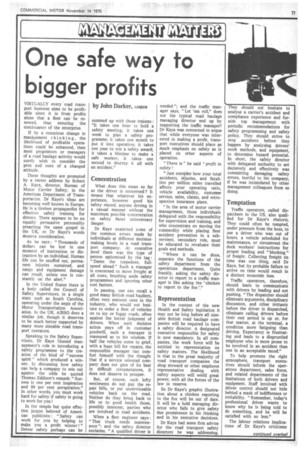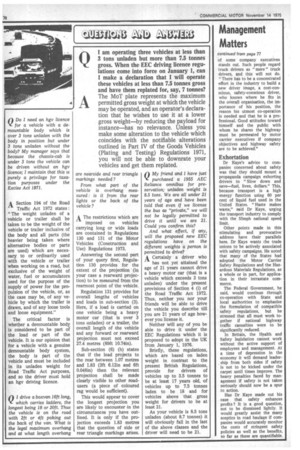One safe way to bigger profits
Page 79

Page 80

If you've noticed an error in this article please click here to report it so we can fix it.
by John Darker, AMBIM VIRTUALLY every 'road transport business aims to be profitable since it is from profits alone that a fleet canbe renewed, thus ensuring the continuance of the enterprise.
If by a conscious change in management thinking, the likelihood of profitable operations could be enhanced, then most proprietors or managers of a road haulage activity would surely wish to consider the pros and cons of a changed attitude,
These thoughts are prompted by a recent address by Robert A. Kaye, director, Bureau of Motor Carrier Safety, in the American Department of Transportation. Dr Kaye's ideas are becoming well known in Europe. He is a tireless propagandist for effective safety training for drivers. There appears to be no equally persuasive personality preaching the same gospel in the UK, so Dr Kaye's words deserve consideration.
As he says : "Thousands of dollars can be lost in one moment of inattention or distraction by an individual, Human life can be snuffed out, permanent injuries sustained, and cargo and equipment damage can result, unless one is constantly on the alert."
In the United States there is a body called the Council of Safety Supervisors, in a single state such as South Carolina, operating under the aegis of the Motor Transportation Association. In the UK, AIRSO does a similar job, though it deserves to be much better supported by many more sizeable road transport operators.
Speaking to the Safety Supervisors, Dr Kaye likened management's role in introducing a safety programme to the creation of the kind of "success spirit" which produced a winner. In discussing how safety can help a company to win out against the odds he quoted Thomas Eddison's remark: " Suc cess is one per cent inspiration and 99 per cent perspiration." In other words, you must work hard for safety, if safety is going to work for you I In the simple but quite effective jargon beloved of Ameri can publicists : "Safety can work for you by helping to make you a profit winner ! " Driver safety perhaps can be summed up with these truisms : "It takes one hour to hold a safety meeting; it takes one week to plan a safety programme; it takes one month to put it into operation; it takes one year to win a safety award; it takes a lifetime to make a safe worker; it takes one second to destroy it all with an accident."
Concentration
What does this mean so far as the driver is concerned ? It means that whatever his experience, however good his safety record, anyone driving in a casual manner without the maximum possible concentration on safety faces unnecessary danger.
Dr Kaye examined some of the common errors made by individuals at different decisionmaking levels in a road transport company. At executive level there was the type of person epitomised by the tag : "Damn the torpedoes; fullspeed ahead." Such a manager is concerned to move freight at all costs, brushing aside safety programmes and ignoring other cost factors.
In passing, one can recall a good many British road hauliers, often very eminent ones in the industry, who would not hesitate to order a fleet of vehicles on to icy or foggy roads, often against the better judgment of drivers. When such decisive action pays off in customer goodwill, such a manager is reassured as to his wisdom. If half the vehicles come to grief, with a huge bill for repairs, the responsible manager can comfort himself with the thought that if a service oriented company does not give of its best in difficult circumstances, it does not deserve to prosper.
But, of course, such lofty sentiments do not pay the repair bills, or put unserviceable vehicles back on the road. Neither do they bring back to life or to good health those, possibly innocent, parties who are involved in road accidents.
When a fleet engineer says : "That truck needs maintenance "; and the safety director exclaims, "A qualified driver is needed "; and the traffic manager says, "Let 'em roll," does not the typical road haulage managing director end up by supporting the traffic manager?
Dr Kaye was concerned to argue that while everyone was interested in making a profit, transport executives should place as much emphasis on safety as is placed on other aspects of operation.
"There is" he said "profit in safety !
"Just consider how your total accidents, itijuries, and fatalities per million miles travelled affects your operating ratio, vehicle availability, customer service, sales, claims, and retrospective insurance plans.
"In the area of motor carrier management, those individuals delegated with the responsibility for supervision and training, and who concentrate on moving the commodity while placing fleet accident prevention in a subservient, secondary role, must be educated to revaluate their goals and methods.
"Where it can be done, separate the functions of the safety department from the operations department. Quite frankly, asking the safety director to report to a traffic manager is like asking the 'chicken to report to the fox '."
Representation
In the context of the new Health and Safety legislation it may not be long before all sizeable British road haulage companies will be required to have a safety director. A designated executive responsible for safety is now mandatory. In all companies, the work force will be entitled to representation on safety matters. The likelihood is that in the great majority of road transport companies the shop steward or other employee representative dealing with safety aspects will wield great power, with all the forces of the law in reserve.
So Dr Kaye's graphic illustration about a chicken reporting to the fox will be out of date. It will be a bold managing director who fails to give safety due prominence in his thinking and in his executive decisions.
Dr Kaye had some firm advice for the road transport safety directors he was addressing_ They should not hesitate to analyse a carrier's accident and compliance experience and furnish top management with periodic recommendations for safety programming and safety policy. They should strive to stop accidents before they happen by analysing drivers' work methods, and equipment, to determine hazard potential. In short, the safety director with delegated authority to act decisively and effectively was committing damaging safety errors, hurtful to his company, if he was intimidated by other management colleagues from so doing.
Temptation
Traffic operators, called dispatchers in the US, also qualified for Dr Kaye's rhetoric. They could often be tempted, under pressure from the boss, to use a driver who was out of hours, a vehicle scheduled for maintenance, or circumvent the dock workers' instructions for proper loading and " blocking " of freight. Collecting freight on time was one thing, said Dr Kaye, but its probable failure to arrive on time would result in a distinct economic loss.
Traffic operators, therefore, should learn to communicate with drivers by leading and not pushing. "The dispatcher should eliminate arguments, disciplinary discussion, and other irritants before the driver is dispatched, eliminate calling drivers before their rest period is up or, for that matter, at the terminal, a condition more fatiguing than driving. Expectancy is frustrating and leads to a disgruntled employee who is more prone to be involved in an accident than one in an acceptable mood."
To help promote the right atmosphere, transport executives should inform the operations department, sales force, and related departments of the limitations of both drivers and equipment. Staff involved with driver control should not hide behind a mask of indifference or irritability. "Remember, today's professional driver wants to know why he is being told to do something, and he will be satisfied with no less."
The labour relations implications of Dr Kaye's criticisms of some company executives stands out. Such people regard truck drivers as "mere " truck drivers, and this will not do. "There has to be a concentrated effort in the industry to build a new driver image, a cost-conscious, safety-conscious driver, who knows where he fits in the overall organisation, the importance of his position, the reason his utmost co-operation is needed and that he is a professional. Good attitudes toward himself and the public with whom he shares the highway must be permeated by motor carrier executives if company objectives and highway safety are to be achieved."
Exhortation
Dr Kaye's advice to companies concerned about safety was that they should mount a propaganda campaign exhorting drivers to "Slow down and save—fuel, lives, dollars." This, because transport is a high energy function using 60 per cent of liquid fuel used in the United States. "Haste makes waste," said Dr Kaye, urging the transport industry to comply with the 55mph national speed limit.
Other points made in this stimulating and provocative address have their parallels here. Dr Kaye wants the trade unions to be actively associated with safety campaigns. He noted that many of the States had adopted the Motor Carrier Safety Regulations and the Hazardous Materials Regulations, as a whole or in part, for application in their intrastate commerce.
The Federal Government, be said, would continue through co-operation with State and local authorities to emphasise the formulation of compatible safety regulations, but he stressed that all must work together if national highway traffic casualties were to be significantly reduced.
In Britain, the Health and Safety legislation cannot work without the active support of employees and management. At a time of depression in the economy it will demand leader_ ship from both sides if safety is not to be kicked under the carpet until times improve. The heavy penalties faced by management if safety is not taken seriously should now be a spur to action.
Has Dr Kaye made out his case that safety enhances profits ? It is a good question, not to be dismissed lightly. It would greatly assist the many sceptics in road haulage if companies would accurately monitor the costs of stringent safety policies as well as the benefits, so far as these are quantifiable.




























































































































